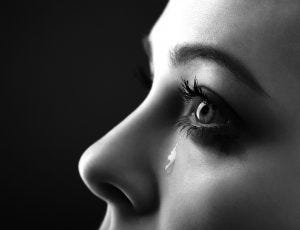My Mother's Daughter

Sitting on the sofa, watching Hillary Clinton speak, my daughter is an arm’s length away, but I’m too embarrassed to look at her. The minute Clinton started speaking, I started to cry. A few tears, and then more, and then the neckline of my shirt is soaked.
After a while, I stop trying to hide it.
She is used to my tears – at other people’s stories, on happy days, even the Clydesdales and the puppy.
Listening to Hillary speak, I realize – surprised -- that I never expected to see this day in my lifetime. I never expected to see a woman with a real chance at becoming President. Voting in the Michigan primary was my first opportunity to vote for a woman on the line marked “President of the United States.”
Clinton said she came to this moment “as my mother’s daughter, and as my daughter’s mother.” It strikes me that we all do.
Her words echo in my head, and I finally look at my own daughter, who is listening intently, but without surprise. She did expect this. She never doubted that it would happen. I think back to the night that Barack Obama was elected. That night, I woke her up, and made her get out of bed to come and watch him on television.
That night, I sat on the same couch, crying the same tears of wonder and amazement. “You’re seeing history, honey,” I told her, and she watched politely for a while. “Can I go back to bed,” she finally asked. Raised in a different, still imperfect world, she never doubted that night’s promise, either.
After she went to bed that night, I called my mother-in-law, born and raised in Selma, Alabama. She never misses an opportunity to vote, although arthritis usually keeps her from going to the polls in person. That time, she set aside the absentee ballot and took the bus to vote. That time, she put up with the pain of standing in line. That time, she wanted the pleasure of voting in person.
I think of my own mother, and how much she would have loved watching this. She took me to hear Shirley Chisholm speak when she ran for President, and told me I was seeing hisory then. I think of her friend Polly, who automatically said "women," correcting everyone who said "girls" or "ladies," until we got it. That generation of women became able teachers and the secretaries who ran the whole office without credit, because those were the doors open to them. But they lived with a sharp, edgy longing born from never using all of their talents.
That’s why Hillary Clinton feels familiar to us, even in this new moment.
We are accustomed to competent women – of all political persuasions – who have done much more than they get credit for, who have been called “shrill” and “pushy” and “bossy,” who have had to balance their talents with the egos around them.
There is both a startling new-ness and a deep familiarity to this.
For all of the mothers and grandmothers who paved the way for this, who accustomed us to competent women, abundant gratitude.
For all of the girls and young women who are completely unsurprised by this, here’s to you. Thanks for understanding our tears.


